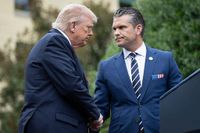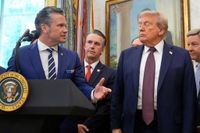The Caribbean is once again the stage for a high-stakes geopolitical drama, as the United States and Venezuela find themselves locked in a tense standoff that has drawn in military hardware, fierce rhetoric, and warnings of chaos from all sides. Over the past month, the Trump administration has dramatically escalated its military presence in the region, targeting what it calls Venezuelan drug cartels while hinting at broader ambitions to unseat Venezuelan President Nicolás Maduro. The resulting crisis has left diplomats, business leaders, and ordinary citizens across Latin America bracing for what could be the most consequential confrontation in the hemisphere in years.
According to NBC News, the United States is actively exploring the possibility of launching targeted airstrikes against drug cartel operations within Venezuelan territory. The plan, which is still awaiting President Donald Trump’s final approval, envisions the use of advanced fighter jets and attack drones to strike drug-related targets. As part of this buildup, ten F-35 fighter jets and six MQ-9A Reaper drones—capable of both reconnaissance and strike missions—have been deployed to Puerto Rico. This move follows a deadly incident on September 2, when American forces attacked a boat allegedly carrying a "huge amount of drugs" from Venezuela, resulting in the deaths of 11 people. The deployment signals Washington’s readiness to act swiftly and decisively, should the order come down from the White House.
This military escalation is not occurring in a vacuum. In the weeks leading up to September 29, the Trump administration dispatched warships to the Caribbean and destroyed three Venezuelan boats it accused of smuggling drugs. These strikes, which occurred on September 2, September 15, and an additional unspecified date, have claimed at least 17 lives. Officials in Washington have justified these actions by designating various Latin American cartels and gangs as terrorist organizations—a move that allows them to invoke the 2001 Authorization for the Use of Military Force (AUMF), originally passed to combat Al-Qaeda and those responsible for the 9/11 attacks. By linking drug cartels to terrorism, the administration aims to give its military actions a veneer of legal legitimacy, though critics argue this stretches the law to its breaking point.
The legal and ethical implications of these strikes have not gone unnoticed. As reported by Defense Priorities, the Trump administration has provided scant details about the legal rationale for these operations, often excluding senior congressional staff from briefings. Senator Rand Paul has gone public with his concerns, describing the September 2 operation as a drone strike and calling the killing of non-combatants without trial "despicable and thoughtless." An anonymous Department of Defense official echoed these worries, stating, "The U.S. is now directly targeting civilians. Drug traffickers may be criminals, but they aren’t combatants." The official further accused the administration of firing the military’s top lawyers to avoid legal scrutiny, raising alarms about the executive branch’s unchecked power in matters of war and peace.
Meanwhile, the Venezuelan government is not sitting idly by. Caracas has responded by arming civilian militias and conducting military exercises with air defense systems capable of shooting down enemy aircraft. The Maduro government, which has faced accusations of torture and grave human rights abuses and was declared the loser of the 2024 election by independent monitors, has refused to step down. The White House, for its part, brands Maduro as a "cartel boss" and a "fugitive of American justice," with some officials conceding that regime change may be the ultimate goal. Opposition leader María Corina Machado has openly welcomed U.S. military assistance to oust Maduro, further fueling fears of open conflict.
The stakes could hardly be higher. Diplomats and business leaders warn that removing Maduro could plunge Venezuela into chaos, with the country’s military, Colombian guerrillas, and paramilitary gangs all vying for control of its vast oil, gold, and mineral resources. As one businessman starkly put it, "You kill Maduro, you turn Venezuela into Haiti." This warning is echoed by Venezuela’s vice president, who argued that Americans "do not want war in the Caribbean." The specter of U.S.-backed regime change evokes memories of past interventions in Iraq and Afghanistan, where initial victories gave way to protracted instability and violence.
The Trump administration’s hardline stance on Venezuela is part of a broader strategy in Latin America. Washington has threatened to seize the Panama Canal, bomb Mexican drug labs, intervened in Brazil on behalf of Jair Bolsonaro, and offered a $20 billion loan to support Argentina’s President Javier Milei. Secretary of State Marco Rubio has been especially forthright, declaring, "We’re not going to have a cartel, operating or masquerading as a government, operating in our own hemisphere." This focus on "our hemisphere" underscores how the administration views Venezuela—not as a distant crisis, but as a direct challenge within America’s own backyard.
Yet, as the U.S. ramps up its military operations, critics warn that the line between law enforcement and warfare is growing dangerously thin. The use of military force for what are essentially law enforcement operations—targeting alleged drug smugglers far from U.S. shores—raises profound questions about the legal and moral boundaries of American power. As Defense Priorities contributor Alexander Langlois notes, "Any so-called strategy that utilizes military tools in clear law enforcement operations violates numerous domestic and international laws surrounding the legal use of military force." The lack of transparency only deepens suspicions that the administration is acting without a solid legal foundation, potentially putting both American and Venezuelan lives at risk.
For now, the world waits to see whether President Trump will approve the next phase of military action. The deployment of advanced fighter jets and drones to Puerto Rico, coupled with the destruction of alleged drug-smuggling boats, signals a willingness to escalate. But with civilian militias mobilizing in Venezuela and the risk of chaos looming large, the consequences of further military intervention could be both swift and severe. The coming weeks may determine not only the fate of the Maduro regime, but also the future of U.S. engagement in Latin America—and the fragile balance between security and sovereignty in the region.
As tensions mount and the rhetoric grows sharper, one thing is clear: the Caribbean is once again a flashpoint, and the decisions made in Washington and Caracas will reverberate far beyond their own borders.


